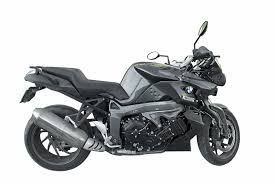
A motorcycle is a complex piece of machinery, so the decision to ride should not be taken lightly. This section helps you decide if you should ride a motorcycle or not. Motorcycle riding is a personal choice that no-one else can make for you. If you ride when you shouldn’t, you may get hurt. If you don’t ride when you could, it is an opportunity lost. Consider, are you:
Impulsive?
Freedom to ride is not freedom from consequences and on a motorcycle the consequences can be big. A crash that dings a car panel will dent your skin. In riding, if you do 100 things right and one thing wrong, what counts? It seems unfair, but it is the one error that counts when riding . Riding safely for 99 days doesn’t offset one act of stupidity on day 100 that puts you in hospital for three months.
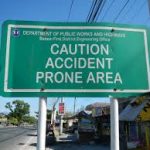
Are you an impulsive type, who does spur of the moment things? Are you an emotional reactor? Do you have regular “Uh-Oh!” accidents, and trip over, knock down or break things unexpectedly? Are an accident prone area? Do you have accidents when walking? If so, you are still a good person, but maybe you shouldn’t ride. An artist creating with paint on a canvas is one thing, but a rider creating with their body on pavement is another!
If you already ride, do you fall off every month? If so, perhaps Life is telling you something, so better listen! Little accidents often precede big accidents! If you don’t change yourself to fit Life, it may change you – permanently. If your accidents don’t decrease after a year, think about giving up the bike. This site won’t work if you are genetically impulsive, because to ride a bike safely needs ongoing impulse control. Your experiences over time will tell you if you have, or can develop, such control. If unsure, ask your friends. They will know if you are accident prone and should not ride a motorcycle.
Fearful?

It is an odd fact that our lives today are safer than ever before but people have more fears than ever before! The Internet and media flood our minds with all sorts of fears. Fear is an old emotion that in the wild was a good thing. When the hawk flies overhead, its shadow frightens the rabbit to stop moving, which makes it less likely to be spotted. Fear makes animals “freeze” when predators are around, so they are not seen. Fear can paralyze you for the same reason, but that is not a good thing on a motorcycle. Riding fearfully is a recipe for disaster because when you ride, your reactions keep you alive.
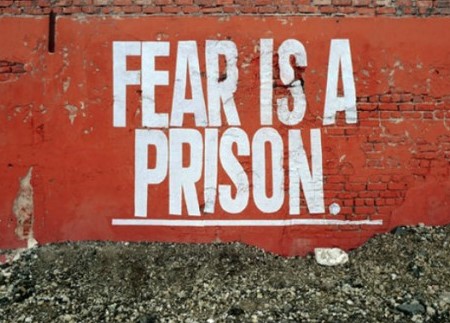
For many people, fear is a prison that stops them doing things. The only way to get out of this prison is to do the thing you fear in a safe environment. You cant “logic” away fear because it is an emotional thing, and for the emotions only experience counts. When doing what you fear, take it easy at first because little steps are big steps here. If you make every step a winning step, with experience the fear will fade, until one day you will wonder what you were so worried about!
Fortunately, fearful people usually won’t touch a motorcycle with a ten-foot pole. They naturally avoid any situation that puts them in danger. So typical new riders are young males with a testosterone fueled fear deficiency. Nature gave young males the job of going out and trying stupid things because a. Sometimes they work, and b. Males are expendable. On a motorbike, the resulting accidents lead them to do one of two things:
- Become afraid of motorcycles and give up.
- Learn to ride safely
Often, after a few crashes, the fear kicks in and they stop riding entirely, perhaps with a little help from a mother, girlfriend or wife. Others decide to face the fear and deal with it, i.e. to ride safely.
Coordinated?
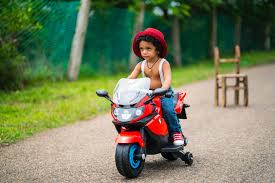
Coordination is your ability to physically control your body in motion. Some people have better coordination than others. A good predictor of motorcycle riding success is prior bicycle riding experience. If you rode a bicycle as a child, you probably fell off and learned stuff. Falling off when young hurts, but you recover quicker, and the memory helps you later on a motorcycle. A motorcycle differs from a bicycle in the hurt potential, but otherwise many principles are the same.
 Sometimes people in their 30’s, 40’s or 50’s see me riding and say, “I can do that.” Being older, they have enough money to buy the bike they couldn’t afford when young. I ask them: “Did you ride a bicycle when young?” If not, I suggest they try riding a bicycle on the road for two weeks, to see how it feels. If they can’t handle that, a 1200cc roadster won’t be any easier (or safer). If you can’t ride a bicycle safely, you can’t ride a motorcycle safely either. If you think a big motor-bike will “protect” you more than a little bicycle, think again. In both cases, the protection is you, not the machine. Motorcycles are faster, so the damage is greater. If you cant imagine yourself riding a bicycle exposed on the road, don’t imagine yourself riding a motorcycle because so many things are the same. Here are some of the things riding a bicycle teaches you:
Sometimes people in their 30’s, 40’s or 50’s see me riding and say, “I can do that.” Being older, they have enough money to buy the bike they couldn’t afford when young. I ask them: “Did you ride a bicycle when young?” If not, I suggest they try riding a bicycle on the road for two weeks, to see how it feels. If they can’t handle that, a 1200cc roadster won’t be any easier (or safer). If you can’t ride a bicycle safely, you can’t ride a motorcycle safely either. If you think a big motor-bike will “protect” you more than a little bicycle, think again. In both cases, the protection is you, not the machine. Motorcycles are faster, so the damage is greater. If you cant imagine yourself riding a bicycle exposed on the road, don’t imagine yourself riding a motorcycle because so many things are the same. Here are some of the things riding a bicycle teaches you:
- Being physically exposed
- Ongoing awareness of surroundings
- Balancing at the center
- Asserting your visibility
- Signaling your intentions
For example, to turn across the traffic on a two-lane road at traffic lights, you have to assertively signal and move your bicycle to the middle lane while respecting existing traffic. Riding a bicycle is a cheap way to find out if a motorcycle is for you.
The Choice?
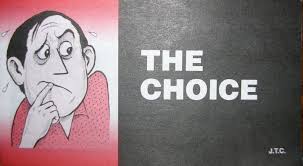
Being impulsive, fearful or uncoordinated are not bad in themselves. Impulsiveness is an aspect of creativity. Fear helps us not get killed. Everyone begins life with poor coordination. Its just that these properties do not fit well with riding a motorcycle. We all react, run away and fall over many times, but we learn. So that is the answer. On a motorcycle, control not creativity keeps you alive. On a motorcycle, courage not fear keeps your mind clear. On a motorcycle, physical not intellectual skills keep you upright. The point is, can you restrain your impulsive nature? Can you put fear in its place? Can you develop riding skills? If you are impulsive, know that without impulse control there is no riding safely. If you are fearful, know that one cannot ride safely while fearful. And if you cant control the bike physically, know that without stability one cant ride safely.

As a young man I was impulsive, fearful and unskilled, yet I still rode. Of course I fell off, but helmet and jacket kept me in one piece. I had one rule – learn from your mistakes. I rarely fell off twice for the same reason. Over time, I controlled my foolish impulses. Over time, I restrained my fears. Over time, I became coordinated. What counts is where you want to be, not where you are now. I took as much care as my hormones allowed and listened to reason not fear.
Now when I ride, I don’t react impulsively. There is literally no fear – just attention. My stability sits at a central point, and skills are automatic. Reactions just come, but this is not where it began forty years ago. I repeat, what counts is not where you are now, but where you want to be.
MTBA
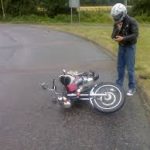 MTBA stands for Mean Time Between Accidents. Everyone has an MTBA even if they are not aware of it. For any vehicle, MTBA is the average time from one accident to the next, where an accident is any human or vehicle damage, not a “near miss”. To find your MTBA, count your accidents over a period of time, regardless of fault. So one accident per year is an MTBA of one and one accident in 20 years is an MTBA of 20. If you haven’t ridden or driven, your MTBA is undefined. The MTBA of young people learning to ride is usually under six months. That means they are lucky to go six months without a dent or a scratch. With experience (a few crashes), their MTBA soon rises to one or two years. Experienced car drivers have an MTBA of about five years, i.e. every five years something happens they didnt expect. Usually the crash is not their fault, but MTBA has nothing to do with fault – it just measures what happens. Good car drivers have an MTBA of about 5-10 years.
MTBA stands for Mean Time Between Accidents. Everyone has an MTBA even if they are not aware of it. For any vehicle, MTBA is the average time from one accident to the next, where an accident is any human or vehicle damage, not a “near miss”. To find your MTBA, count your accidents over a period of time, regardless of fault. So one accident per year is an MTBA of one and one accident in 20 years is an MTBA of 20. If you haven’t ridden or driven, your MTBA is undefined. The MTBA of young people learning to ride is usually under six months. That means they are lucky to go six months without a dent or a scratch. With experience (a few crashes), their MTBA soon rises to one or two years. Experienced car drivers have an MTBA of about five years, i.e. every five years something happens they didnt expect. Usually the crash is not their fault, but MTBA has nothing to do with fault – it just measures what happens. Good car drivers have an MTBA of about 5-10 years.
To ride a motor-cycle safely, your goal is a car MTBA of 10-20 years! This is better than the average car driver. I had better add that when I started riding, I fell off every few months for various “reasons”. Not making the same mistake twice increased my MTBA, but even so, only better than average car drivers make good motorcycle riders.
The Ready Rider
What if I am fearful, careless and incompetent? Well there is hope, as I was like that, but clearly you have to change. Do you want to ride? If you can be careful once, you can do it again. If you can do what you fear once, you can do it again. If you can learn one skill, you can learn another. So, if you want to ride, you can.

Riding safely is balancing opposites, not climbing some ladder to “excellence”. Imagine a pendulum swinging between carefulness and carelessness. You choose carefulness right? But carefulness can create fear, giving worry and doubt, which sap the confidence you need to ride. If you are too careful, you won’t ride at all!
Now imagine a pendulum swinging between doubt and confidence. You choose confidence, right? Yet bold action can breed pride, and pride comes before a fall. Confidence helps doctors, salesmen and politicians succeed by making others believe in them, but it doesn’t change road realities. Asphalt ignores your convictions. It does not hear your justifications. For riders, as for pilots, over-confidence is a recipe for disaster.
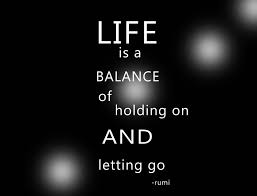
Balance stops these pendulums in the middle. All life is about balance. Between carelessness and doubt, choose neither. The careless stupidly disrespect the world and the doubtful stupidly disrespect themselves. The careless don’t ride long, but the fearful dont even begin to ride. Be careful and courageous. Courage enables action, and carefulness avoids danger. Only the brave get on a bike, but only the cautious stay there. Be both!
Who do you want to be?
What sort of a motorcycle rider do you want be?
 1. The Barbarian. With t-shirt, bandana, sandals and sunglasses, weaving through traffic at high speed protected by tattoos.
1. The Barbarian. With t-shirt, bandana, sandals and sunglasses, weaving through traffic at high speed protected by tattoos.
Also known as: The Risky Rider
Motto: The world is my oyster.
Thought: I want it all and I want it now.
 2. The Rabbit. With fixed and fearful gaze, cautiously crawls along highway slow lanes on Sunday afternoons.
2. The Rabbit. With fixed and fearful gaze, cautiously crawls along highway slow lanes on Sunday afternoons.
Also known as: The Timid Rider.
Motto: Life is dangerous.
Thought: Please don’t hurt me!
 3. The Fox. With a balance of boldness and caution, ends up where trouble is not.
3. The Fox. With a balance of boldness and caution, ends up where trouble is not.
Also known as: The Balanced Rider
Motto: Thinking all the time.
Thought: Look! Listen! Learn!
1 thought on “1.4 Should I ride?”
Comments are closed.